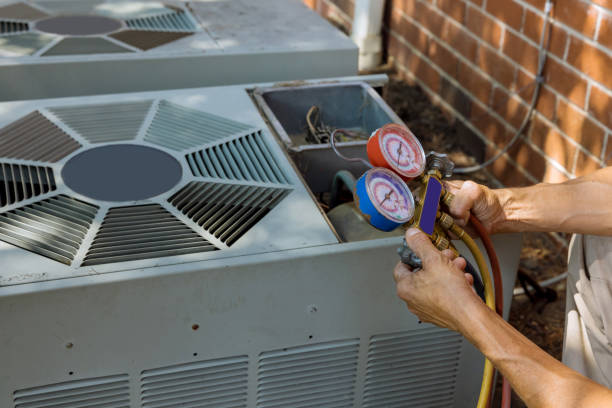As the seasons change, so do the demands placed on your HVAC (Heating, Ventilation, and Air Conditioning) system. Each season brings unique challenges that can impact the efficiency, performance, and longevity of your HVAC system. Understanding these seasonal effects can help you take proactive measures to ensure your system runs smoothly year-round. In this guide, we'll explore how seasonal changes affect your HVAC system and why it's essential to schedule HVAC professional services to keep your system in top shape.
The Impact of Spring on HVAC Systems
Spring is a season of transition, and for your HVAC system, it means shifting from the demands of heating to the cooling needs of summer. During this time, pollen and other allergens can accumulate in your HVAC system, affecting air quality and causing strain on the unit. The fluctuating temperatures can also lead to increased wear and tear as the system cycles between heating and cooling. Scheduling a comprehensive spring HVAC check-up can help identify any issues and ensure your system is ready for the warmer months ahead.
Summer: The Strain of Constant Cooling
Summer puts significant strain on your HVAC system as it works tirelessly to keep your home cool and comfortable. High temperatures and humidity levels can reduce the efficiency of your system, causing it to work harder and consume more energy. Over time, this increased demand can lead to wear and tear on the components, potentially causing breakdowns during the hottest times of the year.
The Transition to Fall
Fall is another transitional period for your HVAC system. As temperatures begin to drop, you'll start relying less on air conditioning and more on heating. This switch can reveal any issues that developed over the summer, such as worn-out parts or low refrigerant levels. Additionally, falling leaves and other debris can clog outdoor units, reducing airflow and efficiency. Scheduling a fall maintenance appointment with ensures your HVAC system is ready to handle the upcoming colder months, minimizing the risk of unexpected breakdowns.
Winter: The Demands of Continuous Heating
Winter places a continuous demand on your HVAC system as it works to keep your home warm and comfortable. Cold temperatures can strain your heating system, leading to increased energy consumption and potential wear on the components. Frozen pipes and potential heat loss through poorly insulated areas can further challenge your system’s efficiency. Routine maintenance is crucial during this season to inspect and clean the heating components, check for any leaks, and ensure your system is operating as efficiently as possible.
Importance of Regular Maintenance in Every Season
Regular HVAC maintenance is crucial for ensuring that your system operates efficiently and effectively year-round. Each season brings its own set of challenges, and without proper maintenance, these issues can compound over time. A well-maintained HVAC system not only reduces the risk of breakdowns but also extends the lifespan of the unit, improves indoor air quality, and lowers energy bills. By scheduling routine maintenance at the beginning of each season, you can address potential problems before they escalate, ensuring your system is always prepared for the changing weather.
Benefits of Seasonal HVAC Maintenance
Seasonal HVAC maintenance offers numerous benefits that go beyond preventing breakdowns. Regular maintenance can improve energy efficiency, leading to lower utility bills throughout the year. It can also enhance indoor air quality by removing allergens, dust, and other contaminants that accumulate in the system. Additionally, seasonal maintenance helps to identify and address minor issues before they become major problems, saving you money on costly repairs. By keeping your system in peak condition, you can enjoy consistent comfort and peace of mind, no matter the season. To reap these benefits, be sure to schedule an HVAC service appointment with Suntech; their expert technicians will ensure your system remains efficient and reliable all year round.
Common HVAC Issues During Seasonal Changes
Several common HVAC issues arise during seasonal transitions. These include clogged air filters, dirty coils, low refrigerant levels, and worn-out components. Seasonal changes can also exacerbate pre-existing issues, such as leaks or inefficient airflow. For instance, as temperatures drop in the fall, any minor issues with your heating system can become more apparent. Similarly, the onset of summer can highlight problems with your cooling system. Understanding these common issues and addressing them promptly through regular maintenance can prevent more significant problems down the line.
Conclusion
Seasonal changes can significantly impact the performance and efficiency of your HVAC system. Each season brings unique challenges that require specific maintenance and care to ensure your system operates effectively. From the pollen-filled air of spring and the relentless heat of summer to the falling leaves of autumn and the freezing temperatures of winter, your HVAC system needs regular attention to handle these varying demands.
Regular maintenance is key to preventing breakdowns, improving energy efficiency, and extending the lifespan of your HVAC system. It also enhances indoor air quality and provides peace of mind knowing your home will remain comfortable, regardless of the weather outside. To keep your HVAC system in peak condition, get professional services at the start of each season. Their expert technicians will ensure your system is always ready to meet the demands of changing seasonal conditions, providing reliable and efficient service year-round.
